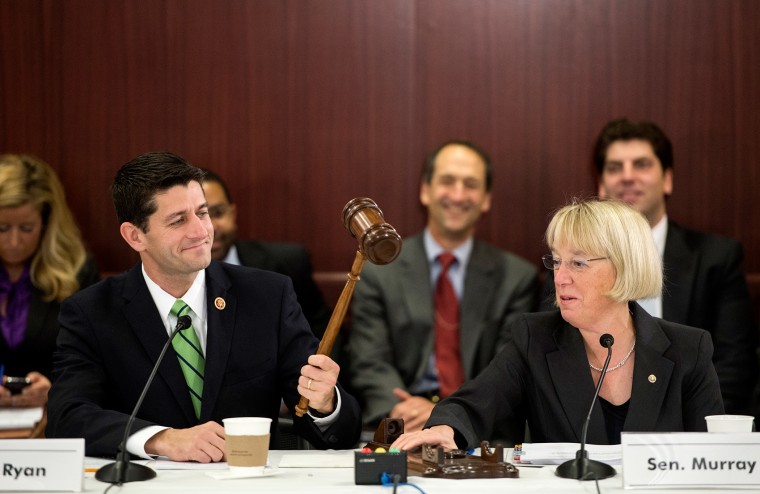Top Congressional leaders are hashing out a small-ball budget deal that would—at most—reverse about one-third of sequestration's cuts over the next two years, according to sources familiar with the deliberations.
Sen. Patty Murray and Rep. Paul Ryan, Congress's budget leaders, are currently aiming for a deal that would undo somewhere between $60 and $80 billion of sequestration cuts over the next two years, according to Congressional aides and others familiar with the talks. Overall, the deal would raise 2014's discretionary spending levels from $968 billion to $1 trillion, and Republicans are insisting on additional deficit reduction.
The basic outlines of the deal are still in flux, and those figures could change in the coming days. "The actual numbers are very fluid. I wouldn't take them as certain by any means," said one Republican aide, who spoke on the condition of anonymity.
But it's becoming increasingly clear that most of sequestration will stay in place in 2014 and 2015. Restoring $60-$80 billion in funding would reverse only a fraction of the total cuts scheduled to take effect, preserving about $150 billion in cuts over the next two years. Even that would be an accomplishment, however, given the enormous political constraints that have forced negotiators to scrape together nickels and dimes for a budget deal.
Republicans have refused to accept any tax revenue, and unless they do, Democrats refuse to touch entitlements. That's taken the largest sources of deficit reduction off of the table. So Ryan and Murray are currently pulling together odds and ends to make a deal, including non-tax revenue like auctioning broadband spectrum and airport security fees, as well as increasing employee contributions to federal workers' retirement programs.
Given the 113th Congress's dismal track record, even an incremental deal is likely to be hailed as an achievement if it can pass before January 15, when the current short-term budget expires. Sequestration's critics say they'll take whatever relief they can get from the cuts. But domestic program advocates and defense hawks warn that a deal that keeps most of sequestration in place would still do real harm to the country.
"Anything will help, but at the end of the day, you need a complete solution. If that's all they can do, we'll all live to fight another day," says Christian Marrone of the Aerospace Industries Association, who said R&D and contracting would still be hit hard.
"There's nowhere to go from up from the current situation, where discretionary spending has hit rock bottom, so any deal is better than no deal at all," said Emily Holubowich, senior vice-president at CRD Associates and a founder of NDD United, a coalition of domestic groups that oppose sequestration. "For the community, nothing short of a full repeal is acceptable."
The restored funding would likely be split evenly between defense and non-defense discretionary spending. About two-thirds of the funding would be restored in 2014, when significantly deeper defense cuts will take effect, and one-third would go towards mitigating sequestration in 2015, sources close to the talks say.
A Ryan-Murray deal would be just the first step towards a budget agreement. Congressional appropriators—Sen. Barbara Mikulski and Rep. Hal Rogers—will then have to decide how to allocate the money to different programs. The appropriators will have a little more breathing room if there's partial relief from sequestration, but they'll still be forced to make tough choices given the spending constraints. And it's unclear how much time they'll even have to sort out the details, as the December 13 deadline for the Ryan-Murray talks isn't binding.
The budget will also have pass both chambers before January 15 to avoid another government shutdown. Republican leaders have downplayed the possibility of another shutdown, and the party may not want to distract from their ongoing campaign against Obamacare.
But expectations of the current Congress are so low, it's no certainty that they'll achieve the bare minimum. "Until they demonstrate some ability to do something, everyone is going to be pessimistic, based on their prior track record," says Marrone.
